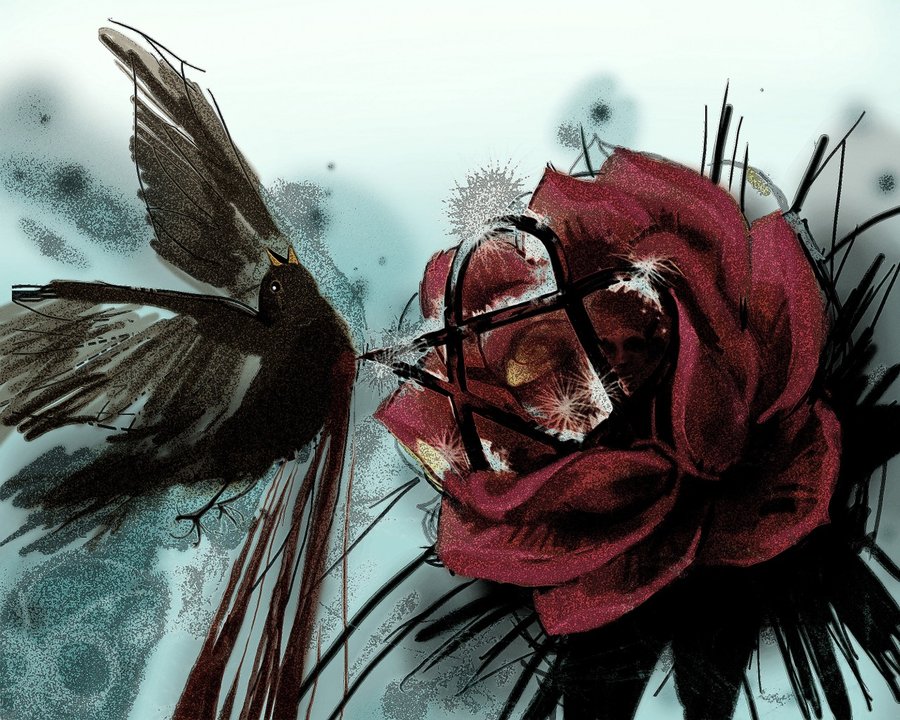“The Nightingale and the Rose” by Oscar Wilde is a timeless masterpiece that deserves heartfelt appreciation for its profound themes, exquisite prose, and poignant narrative. This short story weaves a tapestry of emotions and insights that continue to resonate with readers across generations.
One of the most striking aspects of this story is Wilde’s ability to craft vivid and poetic language that captivates the reader from the very beginning. His words transport us to a world of enchantment and magic, where a nightingale becomes the symbol of selfless love and sacrifice. Phrases such as “her voice was like water bubbling from a silver jar,” or “the moon hung low in the sky like a yellow skull” are just a few examples of Wilde’s remarkable command over language. These descriptions paint a vivid picture of the story’s setting and characters, immersing us in its enchanting world.
Moreover, Wilde’s exploration of themes like love, sacrifice, and the nature of human desires is both profound and thought-provoking. The nightingale’s unwavering commitment to helping the young student win the heart of his beloved is a testament to the selflessness of true love. This theme is beautifully encapsulated in the nightingale’s words: “Love is better than life, and what is heaven but love?”
The story also delves into the superficiality of human desires, as represented by the young student who seeks a red rose to win his beloved’s favor. Wilde uses the red rose as a symbol of love, but he contrasts it with the nightingale’s sacrifice, highlighting the purity of the bird’s love compared to the student’s shallow infatuation. This exploration of the human condition is both poignant and timeless.
Additionally, the tragic ending of the story serves as a stark reminder of the harsh realities of life. The nightingale’s ultimate sacrifice and the student’s callous rejection of her gift evoke powerful emotions, leaving a lasting impact on the reader. Wilde’s ability to elicit empathy and reflection is truly remarkable.
Oscar Wilde’s “The Nightingale and the Rose” is a short story that unravels a rich tapestry of themes, most notably sacrifice, love, and materialism. Through the characters of the nightingale, the young student, and the professor’s daughter, Wilde crafts a narrative that delves deep into the complexities of human emotions and relationships.
The Theme of Sacrifice
At the heart of this story lies the profound theme of sacrifice. The nightingale, serving as the embodiment of selfless devotion, emerges as the central character through whom this theme is brilliantly explored. Her unshakable belief in the transcendent power of love propels her into a realm of extraordinary sacrifice, undertaken to aid the young student in winning the affections of the professor’s daughter.
The nightingale’s journey to procure a red rose, the quintessential symbol of love, serves as a testament to her unwavering dedication. Her readiness to relinquish her own life by piercing her heart on a thorn is a poignant representation of her conviction that true love is worth any price. This act of sacrifice illuminates the story’s overarching exploration of selflessness, compelling readers to contemplate the true value of sacrifices, especially when made for desires that are shallow or fleeting.
Tragically, the story takes a poignant twist as the nightingale’s sacrifice goes unnoticed and unappreciated. The student, initially presented as a romantic hero, ultimately reveals himself to be self-centered and driven by materialistic desires. His casual disposal of the red rose into the gutter, devoid of any appreciation for the nightingale’s profound sacrifice, casts the latter’s act into futility.
The Theme of Love
Love, in all its intricacies and facets, emerges as another central theme in “The Nightingale and the Rose.” The narrative commences with the young student proclaiming his love for the professor’s daughter and passionately longing for a red rose to win her heart. His initial portrayal hints at a sincere quest for love, yet as the story unfolds, it becomes evident that his concept of love is shallow, overshadowed by materialistic desires.
Conversely, the nightingale embodies a purer understanding of love. Her selfless sacrifice in the name of the student’s love serves as a powerful embodiment of her unwavering belief in the existence of true, selfless love. Yet, her sacrifice meets a heart-wrenching fate: the girl’s rejection of the red rose and the student’s cynical declaration that love is unrealistic.
Wilde masterfully employs this stark contrast between the nightingale’s selfless act and the student’s materialistic approach to accentuate the overarching theme that true love indeed exists but is often misunderstood or undervalued in a world where shallow desires and materialism hold sway.
The Theme of Materialism
Materialism permeates the story through the attitudes and actions of several human characters. The young student, the professor’s daughter, and Chamberlain’s nephew all embody materialistic tendencies, reflecting the pervasive influence of material desires in the world Wilde portrays.
The student’s relentless pursuit of a red rose as a means to secure the girl’s affection epitomizes his materialistic perspective. He views love through a transactional lens, as if it can be acquired through a mere material object. His inability to grasp the depth of genuine emotions is highlighted by his superficial judgment of the nightingale’s song as beautiful yet lacking in emotional depth.
The professor’s daughter further exemplifies materialism when she dismisses the red rose in favor of precious jewels. Her choice underscores her preference for material possessions over a symbol of love, reinforcing the narrative’s commentary on societal materialism.
Chamberlain’s nephew’s gesture of presenting precious jewels to the girl furthers the theme of love being portrayed as a material pursuit rather than a true emotion.
Oscar Wilde’s “The Nightingale and the Rose” weaves an intricate tapestry of themes that invite readers to ponder the depths of human emotions and the complexities of relationships. Through the nightingale’s unwavering devotion, the student’s materialistic pursuits, and the professor’s daughter’s superficial desires, Wilde prompts us to question the prevailing values of a society that often obscures genuine love and selfless acts beneath the pursuit of material possessions. The story serves as a powerful critique of a world where true love and selflessness are overshadowed by materialism, inviting us to reconsider the true essence of love and the sacrifices that are genuinely worth making in a society that frequently values the wrong things.
Image Courtesy : https://bitly.ws/UjqJ

